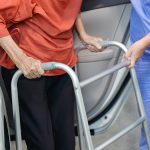-
October 28: The Week in Cancer News
Clinical trial finds select breast cancer patients can forgo surgery, and cancer organizations warn of growing e-cigarette use among teens.
by Thomas Celona
-
Patient and Doctor Partnerships
As more cancer patients take an interest in the science of their care, it’s vital to establish good relationships with doctors.
by Karon Warren
-
October 21: The Week in Cancer News
Chemical hair straightening is associated with higher uterine cancer risk, and gas stoves can leak chemicals linked to cancer.
by Eric Fitzsimmons
-
Exploring a New Frontier
AACR patient advocate forum addresses developments in cancer early detection tests.
by Thomas Celona
-
October 14: The Week in Cancer News
Colonoscopy study results are misreported, and progress is seen in cancer vaccines.
by Kevin McLaughlin
-
Forward Look
A New Breast Cancer SubtypeClinical trial results are changing care for people with metastatic breast cancer that expresses low levels of HER2 protein.
by Kris Conner
-
October 7: The Week in Cancer News
Transportation barriers increase risk of death for people with cancer, and new rules go into effect to give patients full access to medical records.
by Marci A. Landsmann
-
Cancer and Alcohol
Lowering and increasing alcohol consumption is associated with changes in cancer risk.
by Teresa Bergen
Cancer Talk
Many People Don’t Get Colonoscopy After Receiving Abnormal Blood Tests
About half of people who receive abnormal results from colorectal cancer screening tests don’t follow up with a colonoscopy.
by Laura Gesualdi Gilmore
Can Steroids Impair Immunotherapy for Cancer?A new study suggests steroids could blunt the effects of some immunotherapies, but researchers say they remain necessary for some patients.
by Kyle Bagenstose
Treatment Combination Improves Survival in Platinum-resistant Ovarian CancerPreliminary results found that combining relacorilant with nab-paclitaxel improved outcomes for women with advanced ovarian cancer.
by Sandra Gordon
CAR T-cell Therapy Shows Response in Rare Brain CancerPotential new approach to treating diffuse intrinsic pontine glioma uses engineered immune cells infused directly to the brain.
by Taneia Surles












